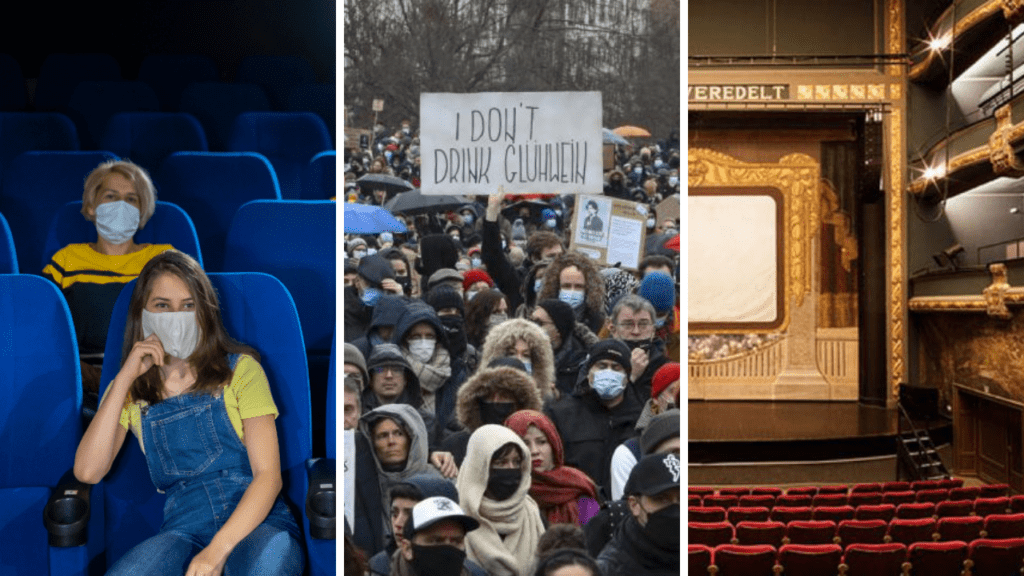As many of us in Belgium and beyond were taking it easy on Sunday, spending time with relatives and still digesting large Christmas dinners, thousands took to the Brussels streets to protest against the closure of cultural spaces.
As the Omicron variant takes the continent by storm, ministers took the decision to prohibit almost all venues – including theatres, cinemas and concert halls – from opening, essentially putting the entire cultural sector on ice in an effort to prevent yet another coronavirus wave.
Now whilst nobody is contesting the need to be cautious in the face of this highly infectious new variant, the decision to shut down the cultural sector outright has seriously annoyed not only those who work there, but also a large portion of the public as well as prominent health advisors.
Accusations of unequal treatment have been levelled at the government and, when you see the crowds of shoppers packed into the Brussels Christmas market, it isn't hard to understand the cries of unfairness. This is particularly so when you consider how cultural spaces have gone to great lengths to ensure that physical distancing is respected. By their very nature, it is easier to regulate a ticketed indoor event than an outdoor space open to all.
Perhaps this explains why, unlike previous demonstrations that have ostracised many and become synonymous with more hardline "anti-vaxxers," Sunday's protest was supported by a broad spread of society and the tacit acceptance of authorities.
What do you think of the decision? Let @OrlandoWhitehe6 know.
BUT WAIT, one last thing: Want news from The Brussels Times in your inbox every morning? Sign up for The Recap, a free daily newsletter containing all the top stories from the day before. Perfect with your morning coffee.
Belgium in Brief is a free daily roundup of the top stories to get you through your lunch break conversations. To receive it straight to your inbox every day, sign up below:
1. Fewer than 2,000 Covid patients in hospital for the first time since early November
The number of Covid-19 hospital admissions in Belgium continues to fall, and dropped below 2,000 for the first time since the start of November, according to preliminary data from the Sciensano national health institute. Read more.
2. Culture sector stages massive protest in Brussels against 'irrational' measures
Belgium’s culture world demonstrated on Sunday at the Mont des Arts in Brussels against the decision announced on Wednesday by the Consultative Committee to close cultural venues, against the background of widespread support for their protest. Read more.
3. Flanders accounts for 70% of all speeding offences
Of the almost four million speeding fines handed out last year by the federal police, 2.8 million offences took place in Flanders, accounting for no less than 70% of the total. Read more.
4. €250 on the spot fines for bicycle thieves
Belgium has a long-running problem with bicycle theft – in Brussels, cases of stolen bikes have shot up in recent years. Yet with plans underway for a nationwide bicycle plan to improve infrastructure and encourage more people to adopt the mode of transport, there is a pressing need to clamp down on thieves. Read more.
5. European Commission proposes minimum corporate tax and end to tax havens in the EU
The Commission proposed before Christmas two initiatives for fair taxation in the EU. The first one is a directive ensuring a minimum effective tax rate for the global activities of large multinational groups. The other one is a directive fight against the misuse of shell entities for improper tax purposes in the EU. Read more.
6. Over 60% of UK residents now view Brexit in a negative light
Over 60% of Britons view Brexit negatively or find that their country’s withdrawal from the European Union has had more negative consequences than expected, according to a survey conducted by the Opinium polling agency for The Observer newspaper. Read more.
7. Hidden Belgium: The old fort at Liefkenshoek
Built by the Dutch in 1579, the old fort at Liefkenshoek is now surrounded by huge oil and chemical installations. But once you have crossed the moat, you find yourself inside a perfectly-preserved star-shaped fortification. Read more.


